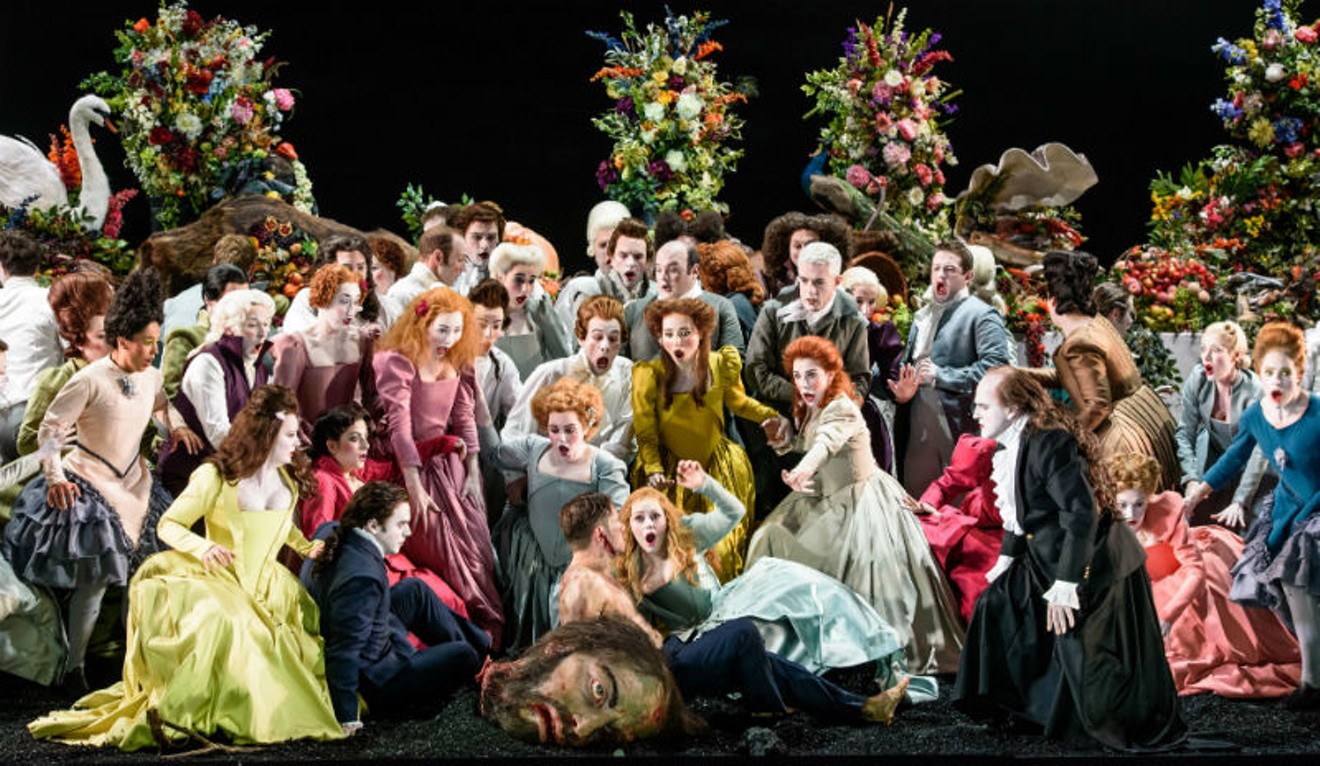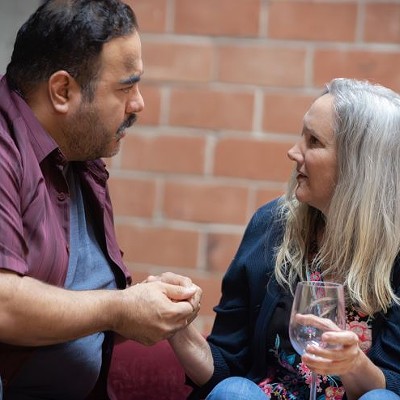Imagine you are Saul. You're the king of the Israelites and have been at war for ten years with the Philistines. It's been a grim decade of starvation, death and destruction. Then along comes David who, incredibly enough, beats the giant Goliath in man-to-man combat. Filled with admiration, Saul welcomes the young upstart, rejoices in his victory and offers him one of his daughters in marriage.
Ah, but then, as the oratorio Saul continues, the king succumbs to an old disease of his — jealousy — and his emotions and events spiral out of control.
Bass-baritone Christopher Purves sings the title role in the Houston Grand Opera production of Handel's Biblical composition, It's a role he's done before including to much acclaim at the Glyndebourne Festival.
"Ir's such fun. It's such an amazing feeling. We talk about ensemble and we talk about it quite glibly in a way: 'Well ensemble just means a lot of people coming together who have a shared interest or a shared goal.' But there's something really special about Saul," Purves says. "There's just so much going on and we all have to concentrate and we all have to look after each other on stage."
Describing his character, Purves says "Like a lot of characters from the Old Testament, they’re not black and white but they tend to have a slightly sort of savage side to them, a really powerful side."
Asked if he's rather play the hero or Saul, Purves laughs and says: "Oh, play Saul every time. There's something so gripping about being able to chart a descent into total degradation and madness and ultimately into death. It's the epitome of what we love to do.
"Saul is already in a way compromised physically and, of course, mentally. And he does have a history of being subject to the ravages of jealousy," Purves says. "When David arrives and has killed Goliath everyone goes absolutely bonkers. This is the best thing that's happened in ten years. Finally they’ve been defeated and the Israelis have won.
So everyone goes 'David, David. We love you. You're our savior. You're brilliant. 'And, of course, Saul goes: 'What about me?' and that’s when the jealousy starts, right early on. He doesn't understand who this man is. Everyone flocks to him. His son. His two daughters. Saul is left bemoaning the fact that no one is actually giving him adulation. He’s a complicated character, that is in itself something that is interesting about the whole possibility of the production.
"You've got one person on a downward trajectory, while the other person is on an upward trajectory. And the downward, of course, is much more interesting because he's going from being the king, the ruler, the all-powerful, to a person who's totally destitute, mad and eventually who dies in battle."
"I don’t think he really knows David. The first thing I say is 'Young man who are you? Where have you come from?' And David says 'I'm part of the family of Jesse.' And I say 'Don't go back; stay with us. You’re obviously a hero. And to show that I really mean you to become part of our family, you can marry one of my daughters.' So immediately Saul is inviting this young man into his inner sanctum," Purves says. " They needed people who could galvanize the spirit."
It’s a passing of the generations, says Purves. "Saul is 50 to 55 and David is represented by the younger generation and it is a passing from one generation to another and, of course, that is difficult for people. It’s the alpha male refusing to bow down to the new alpha male."
In 18th Century Britain, the censor issued a decree banning religious stories on the stage, Purves says. "Handel wasn’t allowed to take a well known Old Testament story and put it on stage. What’s quite interesting is that quite a few of his operas were not as dramatic as his his oratorios," Purves says. " They are bursting with drama but actually had to be performed as a concert rather than as a full operatic production."
To portray Saul, Purves dons a wig that he describes as "a long mane of wild hair." He also sports a big skirt and a jacket with with a white frilly shirt. "By the time the second half starts I have my clothes ripped off. Not all of them, thank God. In order to show how degraded he has become his clothes are ripped off. It's rather like King Lear being sent off into into the heath. There’s quite a strong element of Lear in this production where Saul is really sort of cast out. The point of taking his clothes off is to show that he's an outcast. You can’t really go much lower than where Saul has got to. It's very powerful. It's also a bit disconcerting when you're the one whose clothes have been taken off and you're left there just in a large pair of boxer shorts."
"The music in Saul is baroque. [It has] the most beautiful arias for the counter tenor [David]. It can be violent. It can be soothing, it can be fiery. There's a death march in it which called for the use of trombones, I think for the first time. It's some of the most beautiful music that Handel ever wrote.
"There are huge chorus numbers. The whole first 20 minutes is incredible climax with the chorus right down to the front of the stage bellowing into the audience.," Purves says. "Audiences most certainly will spend two to three hours riveted in what is going on on the stage. Accompaned by some of the most sublime music ever written."
Performances are scheduled for October 25 through November 8 at 7#0 p.m. Fridays, Saturday and Tuesday and 2 p.m. Sunday at the Wortham Center, 500 Texas. For information, call 713-228-6737 or visit houstongrandopera.org. $20-$270.
Support Us
Houston's independent source of
local news and culture
account
- Welcome,
Insider - Login
- My Account
- My Newsletters
- Contribute
- Contact Us
- Sign out
Experience the Madness and Sublime Voices in Saul at Houston Grand Opera
Margaret Downing October 15, 2019 5:00AM

The chorus plays a big part in any production of Saul.
Photo by Bill Cooper/Courtesy of Houston Grand Opera
[
{
"name": "Related Stories / Support Us Combo",
"component": "11591218",
"insertPoint": "4",
"requiredCountToDisplay": "4"
},{
"name": "Air - Billboard - Inline Content",
"component": "11591214",
"insertPoint": "2/3",
"requiredCountToDisplay": "7"
},{
"name": "R1 - Beta - Mobile Only",
"component": "12287027",
"insertPoint": "8",
"requiredCountToDisplay": "8"
},{
"name": "Air - MediumRectangle - Inline Content - Mobile Display Size 2",
"component": "11591215",
"insertPoint": "12",
"requiredCountToDisplay": "12"
},{
"name": "Air - MediumRectangle - Inline Content - Mobile Display Size 2",
"component": "11591215",
"insertPoint": "4th",
"startingPoint": "16",
"requiredCountToDisplay": "12"
}
,{
"name": "RevContent - In Article",
"component": "12527128",
"insertPoint": "3/5",
"requiredCountToDisplay": "5"
}
]
KEEP THE HOUSTON PRESS FREE...
Since we started the Houston Press, it has been defined as the free, independent voice of Houston, and we'd like to keep it that way. With local media under siege, it's more important than ever for us to rally support behind funding our local journalism. You can help by participating in our "I Support" program, allowing us to keep offering readers access to our incisive coverage of local news, food and culture with no paywalls.
Margaret Downing is the editor-in-chief who oversees the Houston Press newsroom and its online publication. She frequently writes on a wide range of subjects.
Contact:
Margaret Downing
Follow:
Facebook:
HoustonPress
Twitter:
@HoustonPress
Trending Arts & Culture
- Fallout Successfully Makes the Transition From Video Game to Streaming Show
- The 10 Best And Most Controversial Hustler Magazine Covers Ever (NSFW)
- Whose Story is It in The Father at 4th Wall Theatre Co.
-
Sponsored Content From: [%sponsoredBy%]
[%title%]

Don't Miss Out
SIGN UP for the latest
arts & culture
news, free stuff and more!
Become a member to support the independent voice of Houston
and help keep the future of the Houston Press FREE
Use of this website constitutes acceptance of our
terms of use,
our cookies policy, and our
privacy policy
The Houston Press may earn a portion of sales from products & services purchased through links on our site from our
affiliate partners.
©2024
Houston Press, LP. All rights reserved.





